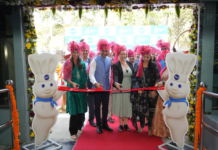Following the recent news on Aptar Freyung receiving ISCC PLUS*- Certification, enabling the use of renewable feedstock material for closures production, Aptar Food + Beverage is excited to announce that the Neo closure solution for the infant formula market is now available in renewable feedstock material based on the mass-balance approach. This polypropylene (PP) closure is made using sustainable renewable feedstock derived solely from vegetable oil waste and residue, such as used cooking oil and residues from oil processing.
There are many sustainability benefits found in using recycled and bio-based materials. First, the reduction of fossil-based resins in food-grade products can reduce the carbon footprint of a closure. Another benefit, from a technical and manufacturing perspective, is that new quality or filling line evaluations are not required.
Aptar plans for increasing the recycled content by 2025
As the resin’s characteristics of fossil-based and renewable feedstock are the same, the closures keep the same level of safety and convenience. In addition, it can help infant nutrition brands to achieve their sustainability goals related to the reduction of CO2 emissions and the incorporation of recycled or bio-based content measured by the mass balance model.
Aptar continues to demonstrate its commitment to designing products and processes with people and the planet in mind. The company remains dedicated to developing and innovating solutions while addressing recyclability and reusability, resin conversion, and sustainable design.
Much of this work is aligned to that of partners, like the Ellen MacArthur Foundation and others, who have a vision of a more circular economy. Aptar is committed to driving a 10% increase in the recycled content of our dispensing solutions for the beauty, personal care, home care, food, and beverage markets by 2025.
IndiFoodBev — authentic, impactful and influential
An English-language food and beverage processing and packaging industry B2B platform in print and web, IndiFoodBev is in its third year of publication. It is said that the Indian food and beverage industries represent approximately US$ 900 billion in revenues which implies more than 20% of the country’s GDP. Eliminating the wastage on the farmside can help to deliver more protein to a higher number of the population apart from generating sizable exports. The savings in soil, seeds, water, fertilizer, energy and ultimately food and nutrition could be the most immense contribution that country is poised to make to the moderation of climate change.
To improve your marketing and grow sales to the food and beverage processing and packaging industry, talk to us. Our research and consulting company IppStar [www.ippstar.org] can assess your potential and addressable markets in light of the competition. We can discuss marketing, communication, and sales strategies for market entry and growth.
Suppliers and service providers with a strategy and budget for targeted marketing can discuss using our hybrid print, web, video, and social media channels to create brand recognition linked to market relevance. Our technical writers are ready to meet you and your customers for content.
The second largest producer of fruit and vegetables in the world is continuously expanding processing capacities and delivery systems with appropriate innovative technologies. We cover product and consumer trends, nutrition, processing, research, equipment and packaging from farm to thali. Get our 2025 media kit and recalibrate your role in this dynamic market. Enhance your visibility and relevance to existing markets and turn potential customers into conversations. Ask for a sample copy of our bi-monthly in print or our weekly IndiFoodBev eZine each Wednesday.
For editorial info@ippgroup.in — for advertisement ads1@ippgroup.in and for subscriptions subscription@ippgroup.in
Naresh Khanna – 10 February 2025
Subscribe Now











